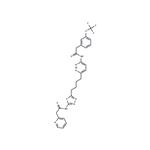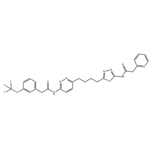Description
CB-839 is a potent, selective, and orally bioavailable glutaminase inhibitor with IC50 of 24 nM for recombinant human GAC. Phase 1.
In vitro
CB-839 exhibits time-dependent and slowly reversible kinetics. IC50 values for glutaminase inhibition by CB-839 following preincubation with rHu-GAC for-1 hour are < 50 nmol/L, at least 13-fold lower than with BPTES. CB-839 has antiproliferative activity in a triple-negative breast cancer (TNBC) cell line, HCC-1806, while no antiproliferative activity is observed in an estrogen receptor–positive cell line, T47D.
In vivo
In the mouse TNBC model, single agent CB-839 (200 mg/kg, p.o.) suppresses tumor growth by 61% relative to vehicle control. In the mouse JIMT-1 xenograft model, CB-839 alone (200 mg/kg, p.o.) results in 54% tumor growth inhibition (TGI) relative to vehicle control, combination of CB-839 (200 mg/kg, p.o.) with paclitaxel (10 mg/kg, p.o.) largely suppresses the regrowth of the tumors resulting in a TGI relative to vehicle control of 100%.
Description
CB-839 (14393999-58-2)?is a potent (IC50?= 24 nM), selective and orally bioavailable inhibitor of glutaminase (KGA and GAC).1?CB-839 displayed an antiproliferative effect in the triple-negative breast cancer cell line, HCC-1806, but no activity in the estrogen receptor-positive cell line T47D.? CB-839 was able to cause proliferation arrest and apoptosis in acute myeloid leukemia cells without causing cytotoxicity against normal human CD34(+) progenitors.2? Aspartate-glutamate carrier 1 (AGC1) inhibition can synergize with CB-839 to limit tumor growth.3
Uses
CB-839 performs an antileukemic activity. It Inhibits GLS1 genes and reduces oxidative phosphorylation leading to leukamic cell proliferation arrest and apoptosis.
References
1) Gross?et al. (2014),?Antitumor activity of the glutaminase inhibitor CB-839 in triple-negative breast cancer; Mol. Cancer Ther.,13?890
2) Jacque?et al. (2015),?Targeting glutaminolysis has antileukemic activity in acute myeloid leukemia and synergizes with BCL-2 inhibition; Blood,?126?1346
3) Alkan?et al.?(2018)?Cytosolic Aspartate Availability Determines Cell Survival When Glutamine is Limiting; Cell Metabolism?28?1


